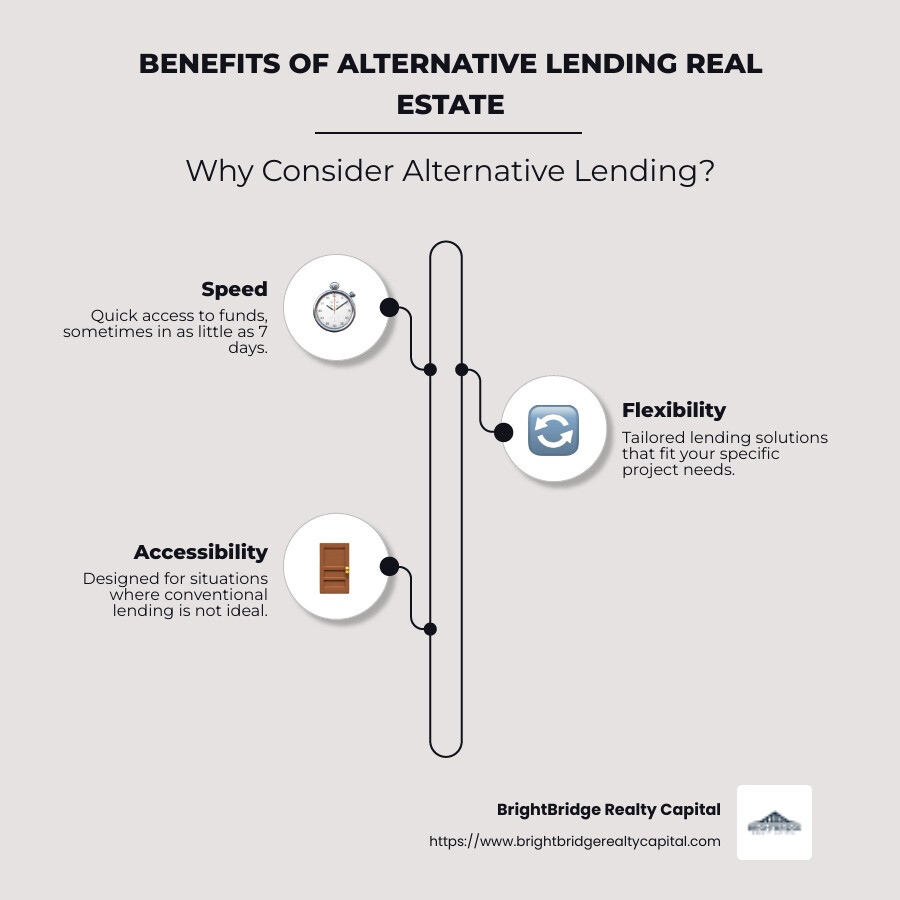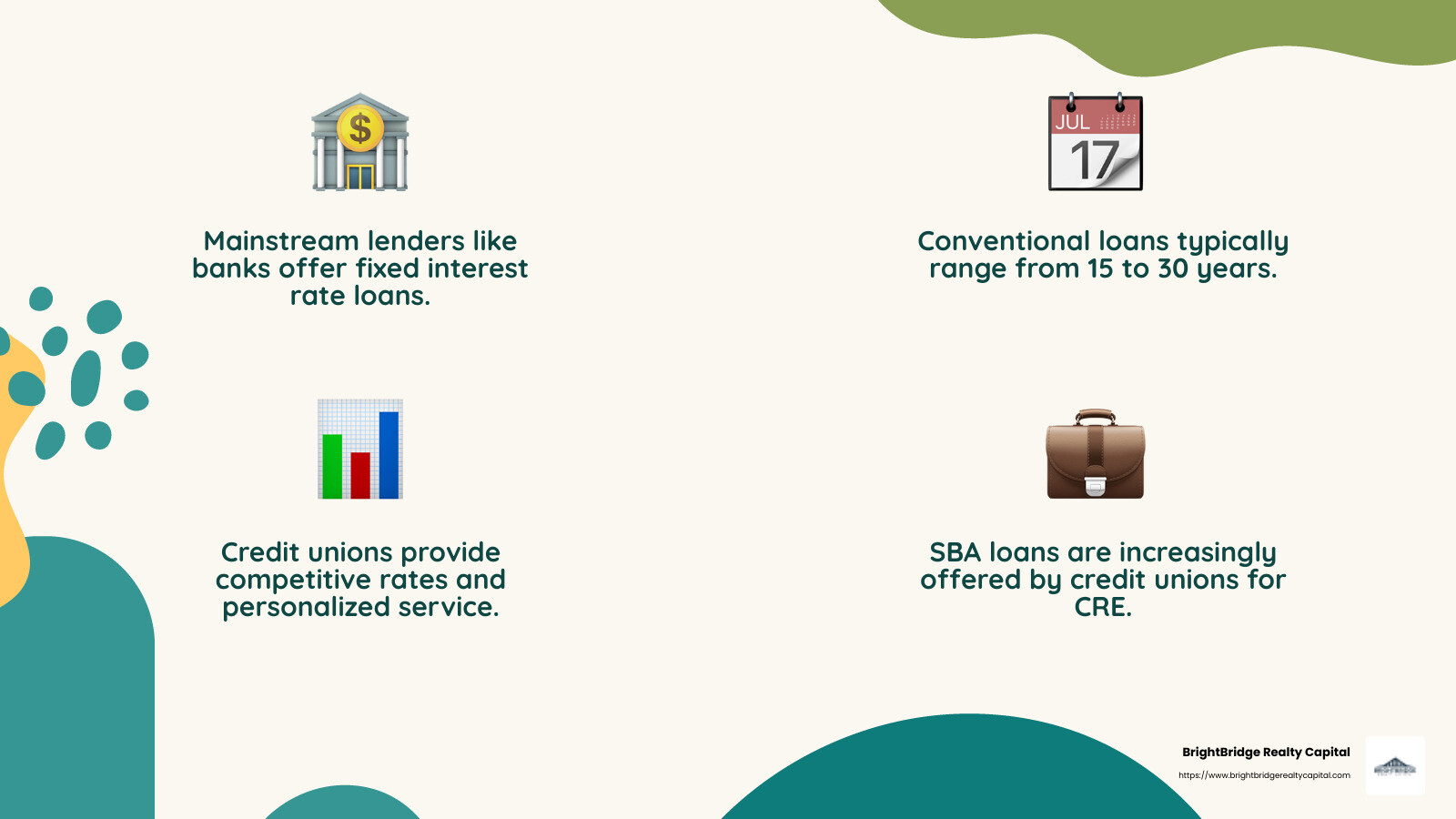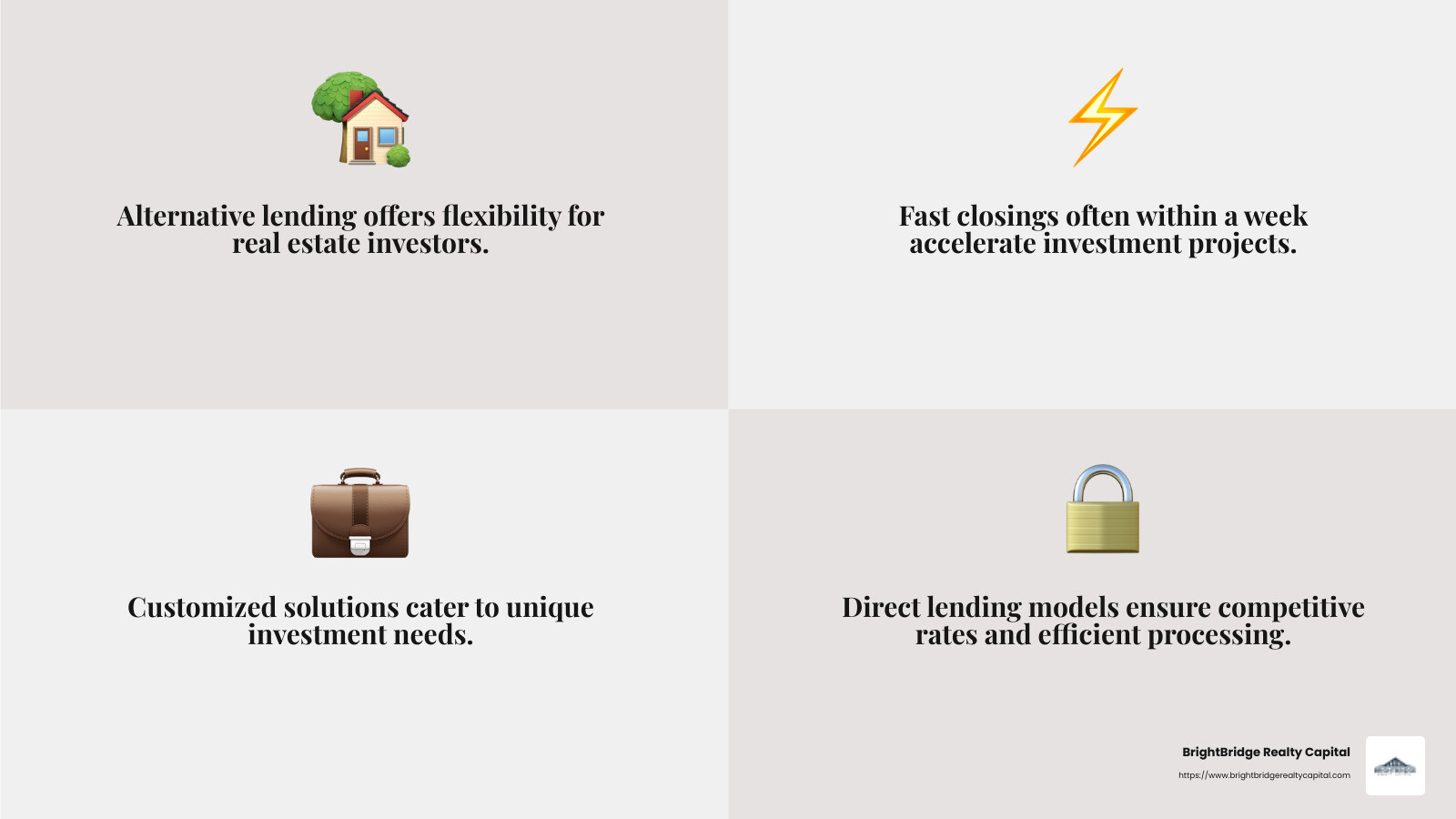Real Estate Lending: Traditional vs. Alternative Options

Alternative lending real estate has become a go-to solution for many real estate investors looking for quick and flexible financing. When traditional banks take too long or impose strict terms, alternative lending offers a fast and often more adaptable way to secure the necessary capital. Here’s a quick look at why it might be the preferable choice for your real estate investments:
- Speed: Quick access to funds, sometimes in as little as 7 days.
- Flexibility: Custom lending solutions that fit your specific project needs.
- Accessibility: Designed for situations where conventional lending is not ideal.
- Diverse Options: Includes private lenders, crowdfunding, and more.
In the changing landscape of real estate financing, traditional lending has long dominated the marketplace, typically offering stable terms through banks and credit unions. These traditional methods, however, often come with rigorous application processes and inflexible terms that don't always cater to the needs of modern investors. That's where alternative lending steps in, providing innovative solutions that break away from the norm.
Alternative lending refers to non-traditional financing avenues, like private lenders or crowdfunding platforms, that offer more flexible and potentially quicker paths to financing. It emerged in response to past financial industry crises and has since been steadily gaining ground. These options bring a refreshing twist to real estate financing by enabling investors to steer the complexities of the market with more agility.
Real estate investors, especially those involved in fix-and-flip projects or expanding rental portfolios, can benefit significantly from these alternative options. The rapid and adaptable nature of alternative lending may very well be the key to seizing timely opportunities without the typical bottlenecks of traditional financing methods.

Understanding Traditional Real Estate Lending
Traditional real estate lending is the cornerstone of property financing. It primarily involves mainstream lenders, such as banks and credit unions, offering conventional bank loans. These loans are the go-to for many because they provide stable and predictable terms.
Mainstream Lenders
Mainstream lenders, like major banks, have been the backbone of real estate financing for decades. They offer conventional bank loans, which are typically characterized by:
- Fixed interest rates: Providing borrowers with consistent monthly payments over the life of the loan.
- Longer terms: Usually ranging from 15 to 30 years, making them suitable for long-term investments.
- Stringent requirements: Borrowers need good credit scores and a steady income to qualify.
These loans are often backed by guidelines set by entities like Fannie Mae and Freddie Mac, ensuring a level of security and standardization.
Credit Unions
Credit unions are another key player in traditional lending. They are member-owned financial cooperatives that offer competitive rates and personalized service. Recent trends show credit unions becoming more proactive in the commercial real estate sector, often providing Small Business Administration (SBA) loans.

The Challenges of Traditional Lending
While conventional loans offer stability, they also come with their own set of challenges:
- Lengthy approval processes: Traditional loans can take weeks or even months to finalize, which can be a drawback in a fast-moving market.
- Inflexibility: The terms are often set in stone, leaving little room for negotiation.
- High barriers to entry: Strict credit and income requirements can exclude many potential borrowers.
This is where alternative lending real estate solutions come into play, offering faster and more flexible options for those who might not fit the traditional mold.
In the next section, we'll dig deeper into how alternative lending is reshaping the real estate financing landscape, providing a more agile and accessible path for today's investors.
Exploring Alternative Lending Real Estate
Alternative lending in real estate is quickly gaining traction as a viable option for those who find traditional lending too rigid or slow. These non-traditional funding methods provide flexibility and speed, making them attractive to a wide range of borrowers. Let's explore the types of alternative lending and the benefits they offer.
Types of Alternative Lending
Bridge Loans
Bridge loans act as a temporary financial solution for real estate investors. They are ideal for those who need to secure funding quickly, often within a week. These loans are short-term, typically lasting a few months to a year, and are used to "bridge" the gap until more permanent financing is available.
Hard Money Loans
Hard money loans are another popular form of alternative lending. These loans are secured by the property itself and are often used by investors looking to flip houses. They come with higher interest rates but offer the advantage of quick approval and funding, which is essential in a competitive market.
Stated Income Loans
Stated income loans simplify the borrowing process by allowing applicants to qualify without the usual documentation, like tax returns or W-2s. Instead, borrowers state their income, making it easier for those with non-traditional income sources to access funds. These loans range from $1 million to $50 million and require a minimum credit score of 650.
Benefits of Alternative Lending
Access to Capital
One of the significant advantages of alternative lending is the increased access to capital. Traditional lenders often have strict requirements that can exclude many potential borrowers. Alternative lending opens doors for those who might not meet these criteria but still have viable investment opportunities.
Flexibility
Alternative lending offers more flexible terms compared to traditional loans. This flexibility includes customized loan solutions that cater to the unique needs of each borrower. Whether it’s a quick flip or a long-term investment, alternative lenders can tailor their offerings to fit the situation.
Speed
Speed is a critical factor in real estate transactions. Unlike conventional loans, which can take weeks or even months, alternative lending options like bridge loans can close in as little as seven days. This rapid turnaround is crucial for investors who need to act fast to secure a property.
In summary, alternative lending real estate provides a dynamic and adaptable approach to financing. It fills the gaps left by traditional lending, offering solutions that are faster, more flexible, and accessible. We'll explore the platforms and models that are driving this shift in the real estate financing landscape.
Alternative Lending Platforms and Models
How Alternative Lending Works
Alternative lending in real estate is revolutionized by peer-to-peer lending, crowdfunding, and online platforms. These models leverage technology to connect borrowers with loan investors, streamlining the lending process.
Peer-to-Peer Lending
Peer-to-peer (P2P) lending involves individuals borrowing money directly from other individuals without the need for a traditional financial institution. Online platforms facilitate these transactions, making it easier for borrowers to find investors willing to fund their projects. This model often results in lower interest rates for borrowers and attractive returns for investors.
Crowdfunding
Crowdfunding has gained popularity as a method for real estate financing. It allows multiple investors to pool their money to fund a single project. Platforms like Yieldstreet enable investors to contribute small amounts, which collectively can fund large real estate deals. This approach democratizes investment opportunities, allowing more people to participate in real estate markets.
Online Platforms
Online platforms are the backbone of alternative lending models. They use technology-enabled models to efficiently match borrowers with investors. These platforms assess borrower credit risk using advanced algorithms, ensuring that investors are informed about the potential risks and returns. By automating the underwriting process, these platforms reduce the time and cost associated with traditional lending.
Loan Investors
Loan investors play a crucial role in alternative lending. They provide the capital that borrowers need, taking on the associated risks for the potential of high returns. Investors can choose loans based on criteria like loan type, size, term, and geographic location, allowing them to build a diversified portfolio that aligns with their risk tolerance.
In this new landscape of alternative lending real estate, technology is at the heart of every transaction. It enables faster, more efficient lending processes, making real estate investment more accessible than ever before. We'll address frequently asked questions about alternative lending in real estate.
Frequently Asked Questions about Alternative Lending Real Estate
What is alternative lending in real estate?
Alternative lending in real estate refers to non-traditional funding sources outside of typical bank loans. These include options like peer-to-peer lending, crowdfunding, and private capital lending. Unlike conventional loans, alternative lending often provides flexible terms and quick access to capital, making it a viable option for those who might not meet the strict criteria of traditional lenders.
How does alternative lending differ from traditional lending?
Alternative lending differs from traditional lending in several key ways:
Flexible Terms: Alternative lenders often offer more flexible loan terms custom to the specific needs of the borrower. This flexibility can be particularly beneficial for unique or non-standard real estate projects.
Quick Funding: The process of securing funds through alternative lenders is generally faster. This speed is crucial for real estate investors looking to close deals quickly in competitive markets.
Credit History: Traditional lenders typically require a strong credit history. However, alternative lenders may focus more on the value of the property or project itself, rather than the borrower's creditworthiness.
What are the risks associated with alternative lending?
While alternative lending offers numerous benefits, it also comes with certain risks:
Higher Interest Rates: Alternative loans often have higher interest rates compared to traditional loans. This is because lenders take on more risk by offering flexible terms and quick funding.
Due Diligence: Borrowers must conduct thorough due diligence to understand the terms and conditions of alternative loans. It's essential to be aware of all fees, penalties, and the overall cost of borrowing.
Financial Risks: As with any investment, there are financial risks involved. Borrowers should carefully assess their ability to repay the loan and the potential impact on their financial situation.
In the dynamic world of alternative lending real estate, understanding these aspects can help investors make informed decisions. As we dig deeper into this topic, we'll explore more about how BrightBridge Realty Capital can offer customized solutions for your real estate financing needs.
Conclusion
In the changing landscape of alternative lending real estate, BrightBridge Realty Capital stands out as a guide for investors seeking customized solutions and swift closings. Our approach is centered around understanding the unique needs of each client and delivering custom financing options that align with their specific investment goals.
Customized Solutions
At BrightBridge, we pride ourselves on offering flexible and personalized lending solutions. Whether you're engaged in a fix-and-flip project, starting on a new construction, or expanding your rental portfolio, we have the expertise and resources to support your endeavors. Our team works closely with you to craft a financing plan that suits your strategy, ensuring that you have the capital you need when you need it.
Fast Closings
Time is of the essence in real estate investing. That's why we prioritize speed and efficiency in our lending process. With BrightBridge, you can expect fast closings, often within a week, allowing you to seize opportunities without delay. Our direct lending model eliminates intermediaries, providing you with competitive rates and a seamless experience from start to finish.

Partner with Us
Choosing the right financing partner can make all the difference in your investment journey. With our nationwide reach and commitment to excellence, BrightBridge Realty Capital is equipped to help you steer the complexities of alternative lending. Whether you're a seasoned investor or new to real estate, we are here to support your growth and success.
Explore our range of customized real estate financing options and experience the BrightBridge difference. Contact us today to learn more about how we can assist you in achieving your investment goals.
In alternative lending real estate, let BrightBridge Realty Capital be your trusted partner for success.


